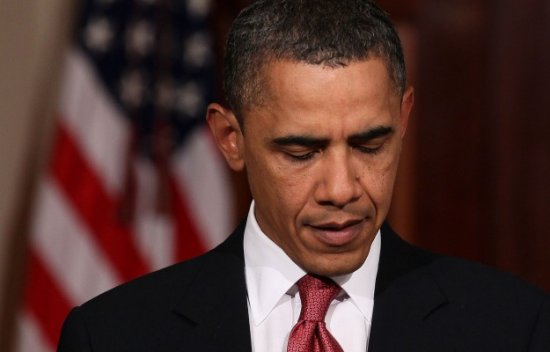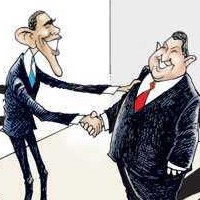![]()
Fri, Feb 11,2011 | The Rubin Report | By Barry Rubin
Mubarak’s Not the One Who Should Resign
This is not a game. This is the fate of the globe. This involves the lives of tens of millions of people. Partisanship and scoring political points is irrelevant.
Forget the spin; forget the ignorance about Egypt and the Middle East by instant experts (and sometimes by top intelligence officials). What has happened in the Egypt crisis?
The first point — which I’ve been warning about for more than two years — is the incapability of the Obama Administration on several different levels. Following George W. Bush, many people thought, was an easy act to follow. But the quality of the American leadership has grown worse.
There has been an attempt to spin President Husni Mubarak’s speech as some type of victory for the Obama Administration. Yet within hours this effort collapsed. The nation’s highest intelligence officials showed they had no idea what the Muslim Brotherhood represents, joked that they didn’t know any more than did CNN, and provided completely inaccurate information on the course of events in Egypt.
When the New York Times, which gets a thrill up the leg every time Obama speaks, can write,
“American officials said Mr. Panetta was basing his statement not on secret intelligence but on media broadcasts,” It seems that Panetta — not Mubarak — should resign not so much for getting the story wrong but for not understanding what his job is supposed to be.
The president of the United States leaped into an issue he didn’t understand, put forward a bad policy, showed he didn’t comprehend the most basic principles of statecraft and diplomacy, publicly celebrated as if he were making a campaign speech projected events in Egypt that didn’t happen, and then admitted that he had no idea what was going on.
Even some of his biggest left-wing fans had to admit this was a debacle. “The mystique of America’s superpower status has been shattered,” said Steve Clemons, of the New America Foundation.
Well, who is shattering it? Not the demonstrators; not Mubarak. That catastrophe can only be traced to one man.
From the Middle East itself, the reviews are indeed shattering. The Saudis, just about the most cautious and conservative government there is in the world, publicly rebuked President Obama on his strategy. This is not primarily an issue concerning Israel. It’s an issue affecting anyone in the Middle East who opposes revolutionary Islamism and looks to the United States as a protector.
Yet what seems to be the administration’s immediate response? Not to step back but to push harder on Egypt’s government to get rid of Mubarak and turn over power to the opposition faster. “The Egyptian people have been told that there was a transition of authority, but it is not yet clear that this transition is immediate, meaningful or sufficient,” Obama said.
Meaningful for whom? Sufficient for whom? As for “immediate,” that’s an American conception. “Immediate” isn’t always good. Obama’s reaction to the events in Egypt was “immediate,” that is based on no good information, study, or planning.
Obama has no idea what he is really saying: The Egyptian government better jump to appease the demonstrators or else! Is there no concept in the White House of regional stability, the battle against revolutionary Islamism, the dangers of anarchy, or the U.S. national interest? Apparently not.
That’s the message Mubarak was trying to convey in his last great public act: I am an Arab warrior not a community organizer.
In other words, the U.S. government has drawn a lesson that is the exact opposite from the one they should be taking. Obama is in danger of becoming Captain Abab, with not just Mubarak but the entire Egyptian government and army cast in the role of the white whale. One almost feels that this is going to end with President Obama going to Tahrir Square to join the demonstrators.
But why hasn’t anyone thought about comparing Obama’s growing obssession with Mubarak to the battle between the two Bush presidents and Saddam Hussein, the dictator of Iraq? It’s worth thinking about. Saddam attacked two of his neighbors, supported terrorism, committed mass murder among his citizens, and tried to destroy U.S. interests. Mubarak has never attacked anyone, fights terrorism, and worked cooperatively with U.S. interests.
As Jon Alterman, a Middle East specialist who supports Obama put it:
“Egyptians enjoyed greater freedom of speech than many other Arabs, and Egypt’s economy was nurturing an increasingly robust private sector….[In the Freedom House survey] Egypt ranked as ‘partly free,’ ahead of every Arab country except Kuwait and Lebanon. In the last decade, Egypt’s stolid, dowdy, and state-owned press began giving way to satellite television and the Internet, and an array of independent publications.”
Obviously, Mubarak’s regime was a dictatorship. People were arrested and tortured and censored. No doubt. But there is a question of degree. The worst dictatorships nowadays are all anti-American and are trying to spread their influence, often through violence. And it’s no accident that the “softer” dictatorships (like the shah and Mubarak) are more vulnerable from within than the all-out, flatten-anyone-who-opens-their-mouth authoritarian states like Saddam’s Iraq or Ahmadinejad’s Iran.
And yet the sole apparent goal of U.S. policy today is the overthrow of not just Mubarak but of the entire Egyptian regime. Or, in other words, for the first time the United States and al-Qaida are on the same side. This is true at a time when the same U.S. government is nicely engaging Syria which combines torture with support for terrorism and killing Americans in Iraq.
Of course, U.S. policymakers would argue that they must get rid of the regime because otherwise it will so incense the masses of Egyptians that extremists will have a better chance of coming to power. I will trust Egypt’s leaders, who know a bit more about the country (and apparently about statecraft) than their counterparts in Washington.
Here, too, is an important assumption that permeats left-wing (not real liberal) thinking about the world: things could be better easily if not for the evil people who have power and riches. Yet how could anyone make Egypt a better place, certainly with any speed?
Where will the money come from to create jobs and raise living standards? No government — no matter how democratic — can succeed in this endeavor. And that leaves just two choices: repression and demagoguery; stop people from complaining or blame your neighbors and incite people to kill them. The Syrian regime, for example, does both.
Among the many fundamental flaws in the U.S. conception another is the idea that if enough people to demonstrate for change — even if they are less than one percent of the population — a government must give them what they want even if it is its own resignation. An elite must hand over its jobs — and possibly homes, weath, and even lives — on demand.
This is not how the Middle East works.
Those in the American public debate have no idea of how they discredit themselves in the eyes of Middle Eastern people, both those who want to be their friends and those who are their fanatical adversaries.
If you’ve spent decades reading Muslim Brotherhood speeches and seeing intelligence about what they say in private you are not likely to pay attention to those claiming that they are moderate.
If you know your own people, you will snicker at those claiming that they are characterized by being or thinking like hip, Facebook-obsessed youth.
If you understand anything about politics, you will not engage in the pleasant dream that a totally unorganized, diverse opposition — lacking a single leader with broad appeal — is going to govern. That’s especially true when there is only one actually organized and disciplined civilian group in the country and they’d love to get you in a torture chamber.
It does not matter what all those well-dressed reporters and articulate “experts” say. They may impress everyone at a Manhattan cocktail party but that doesn’t mean anything in an Egyptian village or Cairo slum.
There are those who argue that the American political elite has gotten out of touch with its own people. That’s not my area of expertise but this is: The American political eite has gotten out of touch with the rest of the world.
I think that it is reasonable to state that, for the rest of his time in office, nobody in the Middle East (and a lot of other places) is going to take Obama seriously.
And here’s the bottom line: If President Barack Obama doesn’t learn the right lessons from this crisis and then gets a second term, that may be the last term for U.S. interests in the region.



 RSS
RSS











#Mubarak's Not the One Who Should Resign | #Obama #Jan25 #Egypt #US http://j.mp/e4zkRv
RT @CrethiPlethi: #Mubarak's Not the One Who Should Resign | #Obama #Jan25 #Egypt #US http://j.mp/e4zkRv